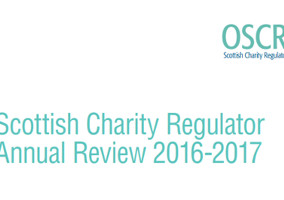The Scottish Charity Regulator (OSCR) is exploring the possibility of charging charities to boost its “insufficient funding”, according to recently filed documents.
OSCR’s latest accounts to March 2018 say the regulator will “await with interest” the outcome of the Charity Commission for England and Wales’ upcoming formal consultation on a range of possible charging models.
The Commission has long talked about a potential charging model but OSCR has changed its position, previously saying it was adequately resourced.
In 2015, OSCR chief executive David Robb said there was “no appetite” in Scotland to start charging, but said: “Had our budget suffered cuts of that scale, I could understand why the question is being asked. But we remain relatively well provided for, so it is not a line we expect to hear in Scotland.”
And in its 2016/17 accounts, the OSCR said it was “not something we are actively considering” in its accounts for the previous year.
But in this year’s accounts, it says: “Whilst this is not something we have previously been actively considering, it is an option which we must now explore.”
Insufficient funding
OSCR says its funding from the Scottish Block has remained at about £3m per year since 2013/14 but warns its expenses are set to increase when the 1 per cent public sector pay cap is lifted in 2018/19.
It says: “Our overall salary bill will increase considerably. Since our budget has remained static, once we have met salary and running costs to which we are contractually bound, the potential to deliver and improve our business within budget will be challenging.”
Staff cost make up the majority of the OSCR’s expenses, with £2.15m being spent on staff in 2017/18 out of the regulator’s total expenditure of £2.99m. It had 48.39 full-time equivalent employees on average during the year.
The OSCR says the lack of funding has meant some staff positions have taken longer to fill than usual.
It says: “Given the financial pressures which we face corporately, vacancies are remaining unfilled considerably longer than was previously the case, which we recognise has the potential to create delivery pressures at a personal level, in some business areas.”
The OSCR also says a lack of funding could impact its plans to expand its online services, even though doing might help the regulator to make long-term efficiency savings.
It says: “Given the funding challenges which the static budget allocation poses, compounded by the annuality of funding, it is unclear how we will be able to meet our commitment to expanding online services without specific project funding being secured.”
The OSCR says it may be required to request contingency funding from the Scottish Government over the next year to cover unexpected one-off costs, as it does not hold any such funding itself.
Related articles












